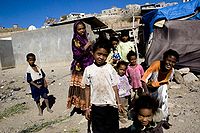BLACK SOCIAL HISTORY
Al-Akhdam

Akhdam children in a Ta'izz neighborhood.
| |
| Total population | |
|---|---|
| 500,000–3,500,000 | |
| Regions with significant populations | |
| Sana'a, Aden, Ta'izz, Lahij, Abyan, Al Hudaydah, Al Mukalla | |
| Languages | |
| Yemeni Arabic | |
| Religion | |
| Islam |
Al-Akhdam, Akhdam or Achdam (singular Khadem, meaning "servant" in Arabic; also called Al-Muhamasheen, "the marginalized ones") is a social group in Yemen, distinguished from the majority by its members' Veddoid-like physical features and stature.[1] They are considered to be at the very bottom of the societal ladder, are socially segregated, and are mostly confined to menial jobs in the country's major cities.[2] According to official estimates, the Akhdam numbered between 500,000 to 3,500,000 individuals.
History
The exact origins of Al-Akhdam are uncertain. One popular account holds that they are descendants of Nilotic Sudanese people who accompanied the Abyssinian army during the latter's occupation of Yemen in the pre-Islamic period. Once the Abyssinian troops were finally expelled at the start of the Muslim era, some of the Sudanese migrants are said to have remained behind, giving birth to the Akhdam. Another theory maintains that they are of Veddoid origin.[1]
Anthropologists such as Vombruck suggest that Yemen's history and social hierarchy that developed under various regimes, including theZaydi Imamate, created a caste-like society.[3] The Al-Akhdam formed a kind of hereditary caste at the very bottom of Yemeni social strata.[4]Intermarriage was also traditionally not practiced, as the Al-Akhdam were deemed untouchables.[1] Though their social conditions have improved somewhat in modern times, Al-Akhdam are still stereotyped by mainstream Yemeni society; they have been called lowly, dirty and immoral.[5] They also tend to work menial jobs.[2]
Studies by Al-Serouri et al. report lower education among the Al-Akhdam. Additionally, due to a poorer understanding of HIV risks, group members also have higher reported rates and risks of contracting HIV infections.[6]
Many NGOs and charitable organizations from other countries such as CARE International are reportedly working toward improving the living circumstances of the Akhdam.[7]However, Huda Sief disputes the extent of these efforts.[8]
Distribution
Most Al-Akhdam live in segregated slums on the outskirts of Yemen's main urban centers.[2] Many of them reside in the capital Sana'a. Others can also be found in Aden, Ta'izz,Lahij, Abyan, Al Hudaydah and Al Mukalla.
Demographics
According to official estimates, the Akhdam numbered around 500,000 individuals in 2004.[2] Other estimates put their number at over 3.5 million residents in 2013, out of a total Yemeni population of around 22 million.[9]
Anthropology
Besides their social position, the Akhdam are distinguished from the majority by its members' Veddoid-like physical features and shorter stature.[1]
Genetics
Genetic studies by Lehmann (1954) and Tobias (1974) noted the sickle cell trait at high frequencies amongst the Akhdam.[1][10] According to Lehmann, this suggests a biological link with the Veddoids of South Asia, who also have a high incidence of the trait.[1]
















































































































No comments:
Post a Comment